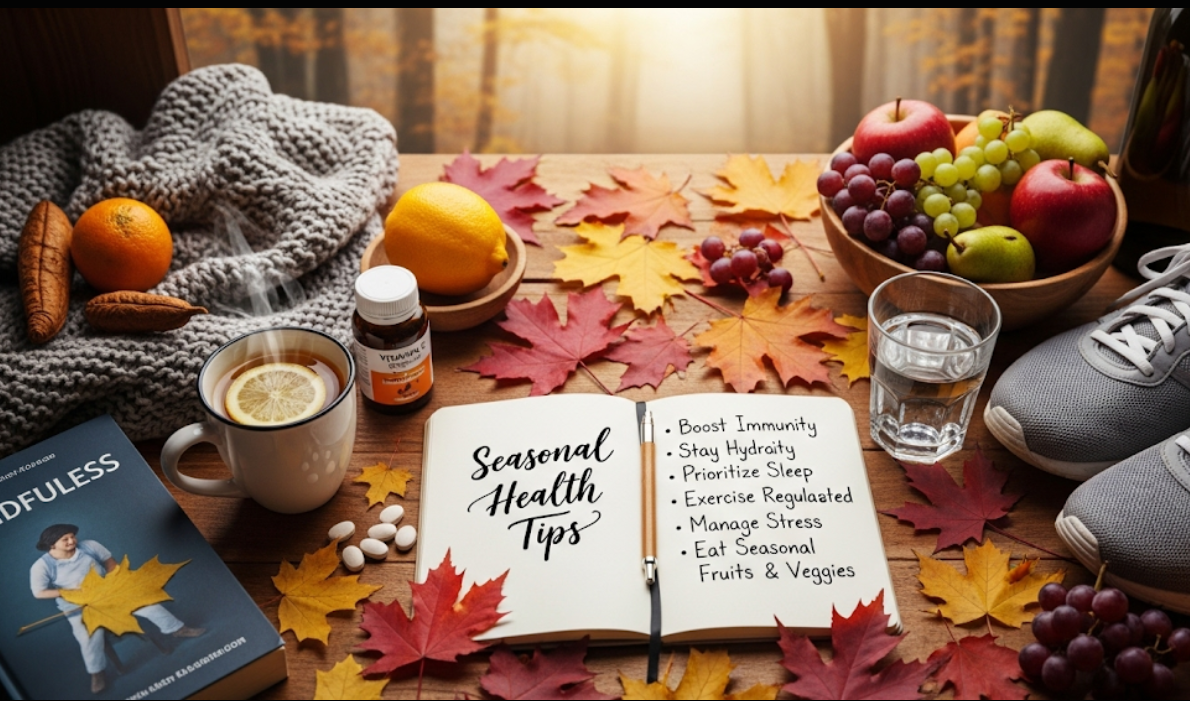Every time the weather shifts, our body feels it. 🌦️ One day it’s warm and sunny, and the next it’s chilly with a breeze that makes you reach for a sweater. While seasonal changes are normal, they often come with their own little challenges: colds, allergies, skin dryness, or even low energy.
The good news? You don’t have to feel drained or sick every time the seasons turn. With a few smart habits, you can protect your health and enjoy the beauty of each season. Let’s dive into nine practical tips that will actually make a difference.
Stay hydrated (even if it’s not hot)
Most people only think about drinking enough water in the summer. But here’s the thing—our body needs hydration year-round. During winter, we often drink less because we don’t feel as thirsty, but dry air can dehydrate us quickly.
Try these simple tricks:
Keep a reusable bottle with you.
Flavor your water with lemon or cucumber if plain water feels boring.
Herbal teas are also a great way to hydrate and stay warm in cooler months. 🍵
Boost your immunity with seasonal foods
Nature is pretty smart. It gives us fruits and vegetables that match our seasonal needs. For example, citrus fruits in winter are packed with vitamin C to fight colds, while summer gives us water-rich foods like watermelon to keep us cool.
Here’s a quick look at some seasonal immunity boosters:
| Season | Foods to Focus On | Benefits |
|---|---|---|
| Winter ❄️ | Oranges, carrots, spinach, nuts | Stronger immunity, warm energy |
| Summer ☀️ | Watermelon, cucumber, yogurt, mint | Cooling effect, hydration |
| Spring 🌸 | Strawberries, leafy greens, peas | Detox and energy boost |
| Autumn 🍂 | Apples, pumpkins, sweet potatoes | Digestive health, stable energy |
Layer your clothing wisely
Seasonal changes can bring unpredictable temperatures. One morning you need a jacket, and by afternoon you’re sweating. Instead of getting sick from sudden shifts, dress in layers.
Start with a breathable base layer.
Add a sweater or light jacket.
Carry a scarf—it works as a stylish accessory and a shield against sudden chills. 🧣
This way, you can remove or add layers depending on the weather.
You may also like: 15 Best Low-Carb Recipes for a Fit Lifestyle
Get enough quality sleep
The shift in daylight hours can mess with your sleep cycle. In winter, longer nights can make you feel sleepy, while in summer, extended daylight might keep you awake longer.
To stay healthy:
Try to stick to the same sleep schedule every day.
Keep your bedroom cool, dark, and quiet.
Limit phone use before bed—it tricks your brain into thinking it’s still daytime.
A well-rested body is always more resistant to seasonal bugs.

Keep moving, but adapt your exercise routine
It’s easy to blame the weather for skipping workouts. “It’s too hot” or “too cold” are common excuses. But staying active is key for immunity and mood.
In summer, try early morning walks or swimming.
In winter, do indoor workouts like yoga, stretching, or even dance routines.
In transitional weather, brisk walking is one of the safest choices. 🚶
The goal isn’t extreme workouts, but consistent movement.
Take care of your skin
Our skin feels the weather first. Dryness in winter, sweat and oil in summer, allergies in spring. Don’t ignore it—healthy skin is part of overall well-being.
Use a good moisturizer in colder months.
Apply sunscreen year-round (yes, even in winter).
Exfoliate gently to remove dead skin cells.
Stay away from harsh chemical soaps that strip natural oils.
A small skincare routine makes a big difference. ✨
Support your mental health
Seasonal changes don’t just affect the body; they affect the mind too. Some people feel low energy or mood swings when the weather shifts, especially in darker months (a condition often called “seasonal affective disorder”).
To stay mentally strong:
Get sunlight exposure for at least 20 minutes daily.
Practice simple mindfulness or deep breathing exercises.
Stay socially connected—don’t isolate yourself when the weather feels gloomy.
Sometimes, even small things like playing your favorite music or spending time in nature can lift your mood. 🌿
Strengthen your gut health
Did you know your gut plays a huge role in immunity? Seasonal flu and allergies often hit harder when digestion isn’t at its best.
Include probiotics like yogurt, kefir, or fermented foods.
Eat fiber-rich foods like oats, apples, and beans.
Avoid overeating heavy, oily meals that slow down digestion.
When your gut is happy, your whole body thanks you.
Practice hygiene and prevention
Seasonal transitions are peak times for colds and flu. While you can’t avoid every germ, you can reduce your risk.
Wash your hands often (still one of the best protections).
Keep a small sanitizer in your bag.
Avoid close contact with sick people when possible.
Regularly clean commonly touched items like your phone, doorknobs, and keyboards.
It’s simple, but it works. 🧼
Quick Recap Table
| Tip | Why It Matters |
|---|---|
| Stay hydrated | Prevents dryness and fatigue |
| Eat seasonal foods | Boosts immunity naturally |
| Dress in layers | Protects from sudden temperature shifts |
| Get quality sleep | Strengthens immunity and mood |
| Keep exercising | Supports energy and fitness |
| Care for skin | Prevents dryness, damage, and irritation |
| Support mental health | Reduces stress and seasonal mood swings |
| Strengthen gut health | Builds strong immunity |
| Maintain hygiene | Prevents seasonal infections |
FAQs
1. Why do I get sick more often during seasonal changes?
Because your body is adjusting to new temperatures, humidity, and allergens. At the same time, viruses spread more easily during transitions.
2. How much water should I drink daily?
On average, 8–10 glasses. But if you’re active or it’s hot, you may need more.
3. Do I really need sunscreen in winter?
Yes! The sun’s UV rays are present year-round, even if it’s cloudy or cold.
4. What foods are best for boosting immunity during season changes?
Citrus fruits, leafy greens, nuts, seeds, yogurt, and seasonal vegetables are the best choices.
5. Can exercise help prevent seasonal colds?
Absolutely. Regular movement strengthens immunity and improves circulation, which helps your body fight infections.
Final Thoughts
Staying healthy during seasonal changes isn’t about doing something extreme. It’s about listening to your body and making small, consistent adjustments. Drink enough water, eat the right foods, sleep well, protect your skin, and stay active. Combine that with good hygiene and a positive mindset, and you’ll notice how smoothly you adapt to new seasons.
After all, each season comes with its own beauty—and you deserve to enjoy it fully without falling sick. 🍂❄️🌸☀️






